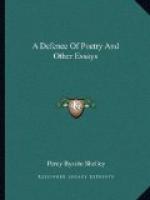It is inquired, for what reason a human being should engage in procuring the happiness, or refrain from producing the pain of another? When a reason is required to prove the necessity of adopting any system of conduct, what is it that the objector demands? He requires proof of that system of conduct being such as will most effectually promote the happiness of mankind. To demonstrate this, is to render a moral reason. Such is the object of virtue.
A common sophism, which, like many others, depends on the abuse of a metaphorical expression to a literal purpose, has produced much of the confusion which has involved the theory of morals. It is said that no person is bound to be just or kind, if, on his neglect, he should fail to incur some penalty. Duty is obligation. There can be no obligation without an obliger. Virtue is a law, to which it is the will of the lawgiver that we should conform; which will we should in no manner be bound to obey, unless some dreadful punishment were attached to disobedience. This is the philosophy of slavery and superstition.
In fact, no person can be bound or obliged, without some power preceding to bind and oblige. If I observe a man bound hand and foot, I know that some one bound him. But if I observe him returning self-satisfied from the performance of some action, by which he has been the willing author of extensive benefit, I do not infer that the anticipation of hellish agonies, or the hope of heavenly reward, has constrained him to such an act.
. . . . . . .
It remains to be stated in what manner the sensations which constitute the basis of virtue originate in the human mind; what are the laws which it receives there; how far the principles of mind allow it to be an attribute of a human being; and, lastly, what is the probability of persuading mankind to adopt it as a universal and systematic motive of conduct.
BENEVOLENCE
There is a class of emotions which we instinctively avoid. A human being, such as is man considered in his origin, a child a month old, has a very imperfect consciousness of the existence of other natures resembling itself. All the energies of its being are directed to the extinction of the pains with which it is perpetually assailed. At length it discovers that it is surrounded by natures susceptible of sensations similar to its own. It is very late before children attain to this knowledge. If a child observes, without emotion, its nurse or its mother suffering acute pain, it is attributable rather to ignorance than insensibility. So soon as the accents and gestures, significant of pain, are referred to the feelings which they express, they awaken in the mind of the beholder a desire that they should cease. Pain is thus apprehended to be evil for its own sake, without any other necessary reference to the mind by which its existence is perceived,




